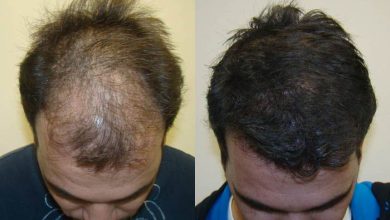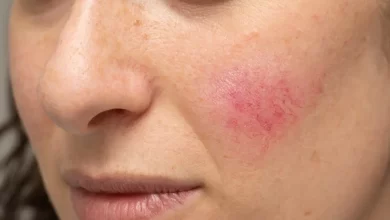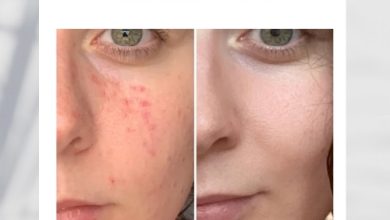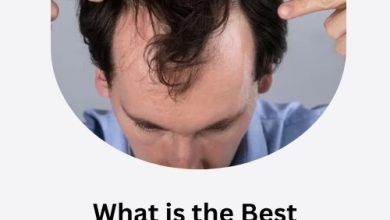5 Mistakes Older Women Make That Contribute To Hair Loss
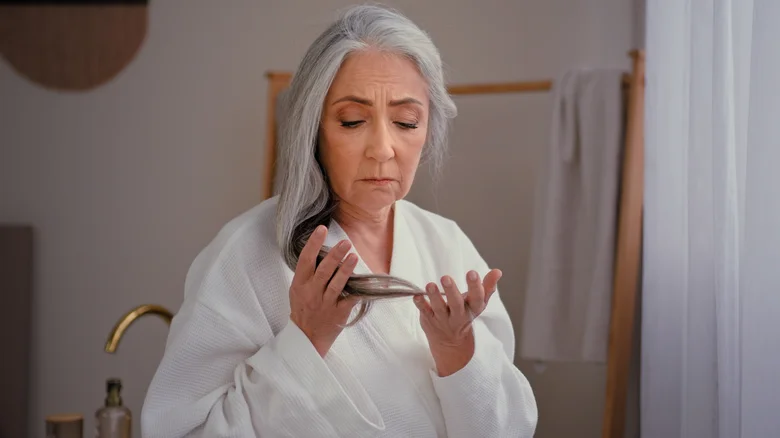
Though hair loss can affect people of all ages, hair thinning is a natural part of getting older for many. There are several reasons why a person might experience hair loss, ranging from medical conditions to side effects of certain medications and even hormones. The general medical term for hair loss is alopecia, and under that umbrella, there are various kinds of hair loss, including androgenetic alopecia (or pattern baldness) and traction alopecia, which occurs following damage from tight hairstyles. Sometimes, hair loss is genetically determined and can’t be reversed or prevented, but other times, there are things that many of us unknowingly do that make it worse, particularly as we age.
To get the lowdown on what common errors contribute to hair loss in older women, Glam spoke to Dr. John Kahen, a hair restoration expert at Smart Restoration in Beverly Hills, California, who confirmed that certain cases of hair loss are inevitable. “Some women with certain medical conditions require medications that can cause hair loss, including cancer (chemotherapy) and heart disease (blood thinners),” he revealed in our exclusive chat. “Alopecia, a genetic condition resulting in hair loss, affects some 2% of the population and can dramatically impact the psychological wellbeing of sufferers. Another cause that may be harder to detect is long-term exposure to heavy metals like mercury, lead, and iron that can be found in some workplaces and homes.” But despite these uncontrollable causes, Dr. Kahen explains that some women are also “unwittingly contributing to their own hair loss problem” through avoidable lifestyle habits, like using harmful hair products or not watching their nutrition. In many cases, handling and treating female hair loss may come down to avoiding these mistakes.
Don’t forget to read the labels on your haircare products
With more haircare products entering the market every single day, it can be difficult to choose a shampoo and conditioner. But Dr. John Kahen warns us that one of the most important factors to consider is the ingredients list since many products contain harmful chemicals that can contribute to or even activate hair loss. “First, learn which chemicals can result in hair loss and avoid them,” he exclusively tells Glam. “Read the labels on shampoos, conditioners, detergents, and thickeners and avoid those with formaldehyde, sodium lauryl sulfate, propylene glycol, glycol distearate, and sodium chloride.”
Dr. Kahen also recommends avoiding products with keratin, which may sound surprising considering keratin is a buzzword in the haircare industry. Keratin — a natural protein found in our hair — can help the hair look shiny when applied in haircare products, but when paired with heat styling, it can actually contribute to breakage. Additionally, many keratin treatments contain formaldehyde, and fixing your hair after a keratin treatment gone wrong will often mean you need to trim off the affected hair. It may take some trial and error to find the right haircare products for you since you also need to take into account your hair type, porosity, density, length, and styling goals, but steering clear of these ingredients is a good place to start if you’ve noticed your hair starting to shed as you age.
Tight hairstyles can cause strain on the hair follicles
As mentioned, traction alopecia occurs when the hair is pulled too tightly, so it comes as no surprise that certain hairstyles can contribute to hair loss. Dr. John Kahen notes in our exclusive conversation that styles like tight braids can lead to older women experiencing “heavy strain on their roots, causing the root follicles to break.” He explains that longer, heavier styles will naturally put more strain on this area. Wearing a tight hairstyle every now and then shouldn’t cause excessive damage, but there are certain styles to avoid wearing long-term if you’re experiencing hair loss as you age. These include tight buns and ponytails and hair extensions on relaxed hair. It’s also not a great idea to wear rollers to bed on the regular.
If you love wearing your hair up, try to opt for looser styles that are comfortable to wear and don’t pull. Also resist the temptation to indulge in a wet updo. While the popular wet-hair look is undeniably chic, your tresses are more vulnerable and prone to damage from tight pulling when they’re wet.
The wrong haircare habits can contribute to hair loss
It’s not just the way you wear your hair that may be contributing to hair loss as you age — it’s also your haircare and hairstyling habits. As Dr. John Kahen notes, “Even a trip to the beauty salon may prove hazardous.” In our exclusive chat, he explains that “brushing your hair for too long or too vigorously can hyperextend hair strands, harm the scalp, and damage hair follicles,” so don’t buy into the old saying that you need to do it 100 times a day. Always use a gentle hand when brushing or detangling, and tread with even more caution when your hair is wet and fragile. When your locks are in this delicate state, you should also avoid being too rough when towel-drying, using hairspray, or even sleeping on it since these can all contribute to damage.
When it comes to styling, using heat tools can be one of the most damaging processes for your hair, leading to brittleness and breakage. But since few of us are willing to say goodbye to our blow-dryers, flat irons, and curling irons, it’s important to heat-style as safely as possible. That means avoiding using heat on sopping wet hair, staying away from excessive temperatures and poor-quality tools, and using a heat-protectant spray. Note that heat-styling doesn’t directly cause hair to fall out of the follicle, but breakage can make existing hair loss or thinning worse, as hair that breaks off may not grow back.
Hair loss may be related to nutritional deficiencies
Like many areas of a person’s general health, hair is impacted by nutrition. Changing your diet won’t miraculously reverse certain types of alopecia if there’s another underlying issue, but for hair to grow at its healthiest, nutritional deficiencies need to be ruled out. Dr. John Kahen shares exclusively with Glam that many older women dealing with hair loss may also be dealing with nutritional deficiencies or eating disorders, such as anorexia.
There are a number of key nutrients that are required for optimal hair growth, including biotin and vitamins A, C, D, and E. Protein is also important, as are omega-3 fatty acids. Additionally, the minerals that aid in hair growth include zinc, iron, and magnesium. You should always chat to a health professional before making any drastic changes to your diet, but Dr. Kahen advises “eating a mostly plant-based diet” and “limiting animal products and processed foods.” Online research will help you determine which food sources will provide the nutrition you need, but a dietitian or nutritionist can help you put together an eating plan that works for you while addressing hair loss specifically. If you aren’t getting these nutrients from your diet alone, supplements can help, but note that supplements won’t make a difference unless you’re deficient or have extra nutritional needs.
Ignoring your stress levels can lead to hair loss
Disclaimer: Being stressed out is not your fault. Life takes it out of all of us! But since chronic stress can lead to various health issues, including anxiety and depression, heart disease, digestive problems, and, yes, hair loss, it’s an important element to unpack. Dr. John Kahen confirms in our exclusive conversation that he tends to observe hair loss in patients with severe stress. But rather than trying to not feel stressed, as that’s not a realistic goal for anyone, focus on dealing with the stress you do experience in healthy ways. Dr. Kahen recommends “exercising for 30 minutes each day, and meditating/practicing yoga/praying to reduce stress.”
Since stress is such a widespread issue, there are endless methods now circulating to help deal with it. These include the conventional treatments like walking or meditation, and the less conventional, including face massages that may help relieve stress or the viral stress-relief practice known as floor time. Find a practice that works for you and your lifestyle, and commit to managing your stress before it starts to affect your health and hair growth.
Reference:
https://www.glam.com/1729103/mistakes-older-women-make-contribute-to-hair-loss-expert/

